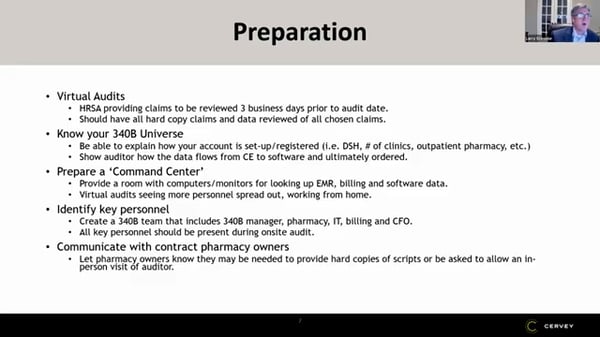
Modern Healthcare Technology Blog

Webinar Rewind: Virtual HRSA Audit: Part 2
To continue business operations during the COVID-19 pandemic, organizations like Health Resources and Services Administration (HRSA) introduced virtual processes to be able to continue to serve covered entities. One of these new processes is a Virtual HRSA Audit.
As a market leader in technology for 340B program management including maximizing savings, ensuring compliance, and optimizing the performance of their contract pharmacies. Cervey is dedicated to helping covered entities learn all they need to know about the virtual HRSA audit experience.
Cervey’s Vice President of 340B Solutions Larry Crowder and Pharmacy Director of White River Medical Center Maggie Williams come together to discuss the new virtual 340B audits by HRSA in part 2 of Webinar Rewind: Understand and Prepare for a Virtual HRSA Audit.
Missed part 1? Catch it here.

Virtual Audits and 28 Claims
Larry Crowder:
Preparation of the virtual audits is obviously a big part. In fact, I would say the audit itself is way less stressful than putting all the information together and getting ready for it and getting prepared for it. One of the nice things about the virtual audits is HRSA is now providing you three business days to get the claims together. So before, when they came on site, they would come onsite and they'd say, here are the 28 claims we're going to look at in each of your universes.
They would look at 28 claims in the mixed use area, 28 claims and contract pharmacy and so forth. Now they're actually sending you those claims prior to the virtual call. That is a really nice thing because it gives you time. You want to take those three business days to look at those claims and get all the data around those claims, so that you're ready for the day of the audit. You should have a hard copy of all the contract pharmacy claims that they pull. Any script that they're going to be asking to review, you're going to want to get that hard copy from the contract pharmacy itself. And again, usually contract pharmacy, it'll be somewhere around 28 claims that they're asking for.
Know Your 340B Universe
You want to know your 340B Universe and be able to convey that to them, communicate what your setup is when you get audited. For instance, if you have one DSH hospital and you have a sole community hospital in the system, and then three clinics and five contract pharmacies, you want to be able to communicate that to them and let them know this is how we're set up.
You want to show the auditor and really when we're talking about audits, they're talking about the process. They want to make sure that your process is compliant. You're going to want to be able to show the auditors how your data flows and how you identify an eligible patient all the way to how that gets ordered on 340B as eligible 340B orders.
Virtual Vs. In-Person Command Center
I recommend that you prepare a command center. This is a little bit more difficult with the virtual audit. I've spoken to some consultants and other accounts that tell me that all their people were online at their houses. Maggie, you actually had a command center. You had a conference room where you joined all the 340B folks together, and you were all in the conference call together.
Maggie Williams:
Yes, we decided to have everybody onsite if possible and it was mainly because when you're doing a virtual audit if you need to pause, or need a moment to discuss some things we could have a group discussion if there is any confusion on the question, or if we needed to clarify something within the group. So, it helped us to have people present, so we would only call them into the room when they were needed other than the core members.
Larry Crowder:
When you prepare that command center, one of the things I would note is you want to have your IT team in there, maybe to set up a printer and be able to print things out, if you want to print things out or at least have everybody able to access the different systems. If you have somebody who really knows your EMR system really well, and they're looking up those dispenses in the EMR system, you want to be able to do that in the command center. And the same thing for your software, if you have software that you want, or a claim that you want to look up and see what it says on the software, you want to be able to do that in that center.
Who is in Your Command Center?
Larry Crowder:
Identifying the key personnel. This obviously goes with who's going to be in the command center. Do you want everyone in there that is associated with 340B? That would include the 340B manager. You might want the buyer, one of the nice things about the virtual audit is before the auditor would come onsite and they would actually review how the buyer buys and stand behind the buyer. For those of you, who've had an onsite audit that is not happening anymore with the virtual obviously, they're not able to go and watch the orders come in or watch the buyer do their buying.
So that goes a little bit with what I've been hearing, that it's a little bit more streamlined and it's a lot quicker. In fact, I've heard from most instances that these audits are being performed in one day, almost half a day, like by 11:00 AM to 2:00 PM, the auditor has completed what they needed to know, because so much preparation can be done now before they actually get onsite, especially since they're giving you the claims. Was that your experience, Maggie?
Maggie Williams:
Yes. They had it scheduled from eight to 4:30 and by probably one o'clock she said, "We'll wrap this up very soon." We had a couple of things we were having to find before the call could be wrapped up. So, we ended up having our exit interview at about three o'clock. There are certain items they would not let you post after the call. It had to be done before the end of the call. And so we were verifying that, but overall, it went very smoothly. When you talk about mock review of your data, what I would also suggest is anybody you're going to have to manage and navigate your EMR because it's all virtual. They're going through each EMR from those sample claims and you have to find the data for each sample, give that information to the person who's going to go through the EMR ahead of time.
Let them go through that individually, because we went ahead and went through all of our sample claims and we found a couple of confusing instances that we might've been caught off guard if we would have waited until the audit. One example and if you're in the hospital, you may be familiar with this. If you have a patient who goes to a clinic and then comes to the hospital, and the same day, they actually will merge those two accounts together. And we had one of those in our sample and we found that they had visited our rheumatology clinic and the same day had come to the hospital. So, if I would have pulled up that rheumatology number, I would not have found the information I needed. So, we were prepared for that. When we went through that sample audit, I'd told her, this is why it's under this number. And I showed her how they were merged. And so make sure you go through and do your mock audit with your sample list. So, you're not caught off guard.
Larry Crowder:
I do want to reiterate, too, that the administrators should be onsite that attest to everything on their HRSA registration. You want to make sure that they are there for the audit. They don't have to be there 100% of the time, but I do believe the auditor likes to see their presence there. So, the last thing I want to talk about is communicating with contract pharmacy owners. This really is more about the onsite audits. When they have an onsite audit, a lot of times we've had auditors before that actually went to the contract pharmacy and wanted to observe and make sure that the techs there that we're giving the NDCs to the patients, we're not misunderstanding anything about 340B.
They just wanted to make sure that everything was happening in the background, and nobody was making their decision afterward on who gets 340B and who doesn't in those instances. They don't do that with the virtual audits and the hard copies of scripts is something that you can get beforehand, but you do want to get those hard copies of scripts and get those uploaded to the site that HRSA gives you because they will not close out the audit or be finished with the audit until they have all that information. If you wait till the day of, and then you say, “Oh, we need to get these hard copy scripts.” That audit is going to remain open until they can get those scripts from you. I would assume most of you want the audit to be done as quickly as possible.
For a Faster Audit, Prepare Ahead of Time
Maggie Williams:
I would say when you get your sample list,... We got it on a Thursday and it was on a Tuesday. So that was kind of nice. We did have a little more time. You definitely want to pull as much as you can. We uploaded all our sample scripts to the secure website before the audit.
We also pulled all the Medicaid actual claims from our EMR because and if they want those as well from the sample list, so if they don't, they didn't exactly tell you that in the description but I did ask to clarify, so we went ahead and pulled those ahead of time. So, anything you can do to prepare, like Larry said, it just makes that day definitely go smoother.
Document Your 340B Universes Often
Larry Crowder:
I think it's a good practice to create the documentation of your 340B Universe and just keep that up-to-date. If you add on a clinic or if you know cancel a partnership with one of your contract pharmacies, you want to always keep that up-to-date of what your universe looks like today, and you want to just review that consistently for accuracy. You want to make sure that you can speak to that on the first day of the audit. I think it's easier if you just keep up with that. It's just a matter of telling the auditor where you are currently. I would highly suggest forming a 340B team of key personnel, and that you meet consistently to discuss any kind of 340B issues
I think even on this team, it can include nurses, if they're entering in information into the EMR system, that affects how that data is getting to your software, you just want to make sure that everybody's on the same page and they understand the savings the program brings. And compliance is high-level important. So, I'd definitely recommend having this and just meeting consistently. And then we also recommend that you always have an outside independent company perform a mock audit. So at least annually a person does ask about this. They ask if you're having an independent auditor come, there's nothing in the statute about this as far as requiring it, I think what would probably happen is you get an RFI or room for improvement, and it's what they call it, if you did not have that. But I do believe they specifically ask everyone that I know of. Maggie, did they ask you about outside audits?
Maggie Williams:
They did. They asked about our internal audit process and external audit process. We have both. On our external audit, she wanted to see our last audit that was performed. So, we had to upload... She didn't want to see the results as necessarily the details, but she wanted to show that we were doing it and she also wanted to see a blank audit sheet that we use to audit. So, what data do you collect? And all the information we collect, she just wanted to see the form we use for our audit. And that was definitely a discussion as far as how often. Now, from my understanding, when you're having these audits done, all they're doing is asking questions, they cannot give you feedback. They cannot... You don't get a feel if you're doing it right or wrong. All they do is they seem to ask questions and they report back to HRSA.
So sometimes you feel like you're in trouble, but it might just be they're just asking you a question and you just answer to the best of your ability. And that was something that was just different. They can't say yes or no, they just say, what do you do when you respond?
Follow us to stay tuned for part 3 of the Webinar Rewind series for “Understand and Prepare for the Virtual HRSA Audit Experience” here:
Ready to make 340B program audits, virtual or in-person, easier on you and your team? Contact us for a demo of our 340B suite of web-based products.
Looking for the rest of the webinar series? Check out parts 1 and 3-6 below:
- Webinar Rewind: Virtual HRSA Audit Part 1
- Webinar Rewind: Virtual HRSA Audit Part 3
- Webinar Rewind: Virtual HRSA Audit Part 4
- Webinar Rewind: Virtual HRSA Audit Part 5
- Webinar Rewind: Virtual HRSA Audit Part 6


